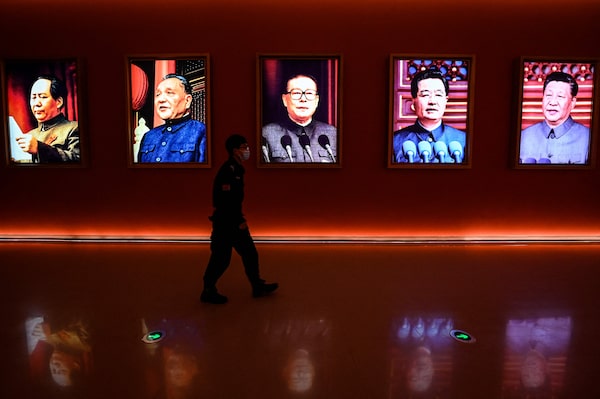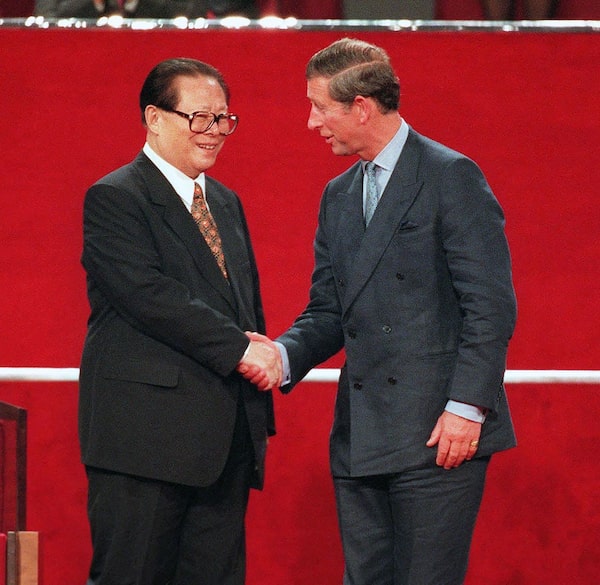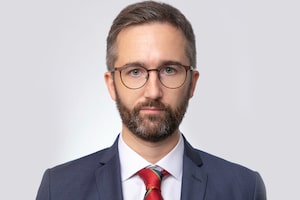Former Chinese leader Jiang Zemin is featured on a screen at the Communist Party of China's centennial celebrations in Beijing in 2021. Mr. Jiang died Wednesday at the age of 96.Thomas Peter/Reuters
Jiang Zemin, the former Chinese leader who hastened the country’s embrace of capitalism and repaired ties with the West, has died. He was 96.
An official announcement said: “Our beloved Comrade Jiang Zemin died of leukemia and multiple organ failure” around midday Wednesday.
His death comes at a delicate time for the ruling Communist Party. A wave of protests denouncing the country’s tough COVID-19 policies has unleashed anger directly at the party itself and President Xi Jinping. In the past, memorials for former leaders have become politically charged, a rare chance for public demonstrations, and while Mr. Jiang was hardly a liberal reformer, his era in power is remembered by many as one with more personal freedoms than today.

Beijing's Tiananmen Square, during 1989's protests and 30 years later. Mr. Jiang came to power after the crackdown on the pro-democracy movement.CATHERINE HENRIETTE,GREG BAKER/AFP/Getty Images
Mr. Jiang’s own career was boosted by just such protests. He was an obscure Shanghai bureaucrat when he was selected by paramount leader Deng Xiaoping to head the Communist Party – under the older man’s close watch – in the wake of the Tiananmen Square crackdown of June, 1989.
Few expected Mr. Jiang to last long, let alone become a transformational figure.
“He was helicoptered to the top, thrust into this position to everyone’s surprise, probably not least himself,” said David Shambaugh, author of China’s Leaders: From Mao to Now.
In an interview in 2000, Mr. Jiang said he’d had “no intention of heading the whole country” and “hoped that a more capable candidate would take the job.”
But he proved a deft politician, cultivating allies across the party, state-owned enterprises and the military.
“He didn’t just survive a few months, but 13 years in power, the longest since Mao,” Dr. Shambaugh said.
He confounded his naysayers, expediting China’s embrace of a market economy that began under Mr. Deng, Mr. Zhao and former leader Hu Yaobang.

Portraits of Chinese leaders Mao Zedong, Deng Xiaoping, Jiang Zemin, Hu Jintao and Xi Jinping adorn a memorial hall in Yan'an city, Shaanxi, during this past October's Communist Party Congress.JADE GAO/AFP via Getty Images
Mr. Xiang laughs with Canadian prime minister Jean Chrétien in 1997.Tom Hanson/The Canadian Press
Mr. Jiang encouraged entrepreneurs and businesspeople to join the Communist Party. In 2001 he secured China’s membership in the World Trade Organization, beginning a decades-long boom that has seen the Chinese economy grow to become the second-largest in the world.
Canada supported China’s admission to the WTO, and Mr. Jiang met multiple times with then-prime minister Jean Chrétien, describing him as an “old friend.” Chinese officials have often describe that period as a “golden era” – a stark contrast to the testy relationship between Ottawa and Beijing today.
In 1997, in a trip to promote détente with the United States, Mr. Jiang met with then-president Bill Clinton. In a speech delivered in English, Mr. Jiang quoted poet Henry Wadsworth Longfellow, saying both sides should forget the past and “act in the living present.”

Mr. Jiang shakes hands with Charles, then Prince of Wales and now King, during the 1997 Hong Kong handover.KIMIMASA MAYAMA/AFP via Getty Images
Under Mr. Jiang, China also finalized the handover of Hong Kong from Britain in 1997, after more than 150 years of colonial rule. He counted that among his proudest achievements.
The “one country, two systems” governance model that Beijing set up for Hong Kong, giving its residents freedoms mainland Chinese did not enjoy, was seen as a blueprint for gaining control of Taiwan. But Mr. Jiang took a tough line with the latter, menacing the island with war games and missile tests in the run-up to its first direct presidential election in 1996. It backfired, boosting pro-independence figures and souring bilateral relations for more than a decade.
When thousands of members of the Falun Gong spiritual group staged an audacious protest in the heart of Beijing in 1999, Mr. Jiang launched a brutal crackdown that continues to resonate today. Pro-democracy activists and Tibetan independence advocates were also dealt with harshly.
Practitioners of the banned Falun Gong movement demonstrate on the outskirts of Beijing in 1999.REUTERS
In 2002, Mr. Jiang retired as party leader and handed the reins to Hu Jintao in China’s first orderly leadership transition since the 1949 revolution. Like Mr. Deng before him, however, he continued to exercise power from behind the scenes, with some observers suggesting it was his support that helped elevate Mr. Xi over Mr. Hu’s favoured successor, current Premier Li Keqiang.
David Mulroney, a former Canadian ambassador to China, recalled being introduced to Mr. Xi by Mr. Jiang in 2003. “He said, ‘This is Xi Jinping. You’re going to be hearing a lot more about him,’ ” Mr. Mulroney said.
Unlike Mr. Hu, who was humiliated at the Communist Party Congress in October, escorted off stage in view of international media for unclear reasons, Mr. Jiang and his family have remained relatively unscathed by the sweeping anti-corruption campaign launched by Mr. Xi since he came to power.
Many blame Mr. Jiang for opening the floodgates to corruption with his reforms and embrace of the new business elite. As party officials saw new millionaires being minted daily, the temptation became too much, and graft and cronyism exploded. But despite this and other dubious legacies, Mr. Jiang is remembered fondly by many today – both for the boom times he oversaw and the personality he displayed in public, something decidedly lacking in both of his predecessors. For a man who came to power seemingly by chance, he could be remarkably confident, even charismatic.
He was a lover of music, particularly opera, and not shy about it. During a visit to Sydney in the 1980s, Kevin Rudd, the future Australian prime minister, joined Mr. Jiang on a tour of the city’s famous opera house. “It was just us in there. He got up on stage and gave a rendition of O sole mio,” Mr. Rudd said. “It left us all in a stunned silence, and then we started clapping, delighted at this glimpse into a remarkable missed operatic career on the part of the soon-to-be general-secretary.”
With a file from Reuters
 James Griffiths
James Griffiths